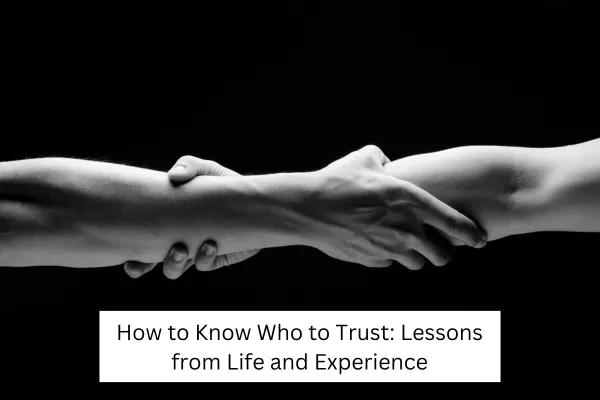Welcome To The Official Blog Of The
🎊 Attractive Relationships Podcast 🎊

How to Know Who to Trust: Lessons from Life and Experience
Trust is one of those tricky parts of life that everyone wrestles with. Whether it's in relationships, friendships, or professional settings, the question of who to trust looms large. Over the years, I’ve stumbled my way through this challenge and picked up a few lessons—some the hard way.
Here’s the thing about trust: people don’t always say what they mean, and they don’t always mean what they say. Words are easy, but actions? Actions reveal the truth.
The Early Lessons
When I was younger—teenage years, early 20s—I was still figuring out how to interact with people. Dating, friendships, even casual encounters—it was all exciting and new. Back then, I took people’s words at face value. If someone said they had big goals, I believed them. If someone promised they’d be there for me, I trusted it.
But reality has a way of showing up. I started noticing something: what people said didn’t always match what they did. They’d talk about ambitions or values, but their actions painted a different picture. At first, I chalked it up to chance or bad days, but over time, patterns emerged.
Why Actions Speak Louder Than Words
Here’s a truth I’ve learned: everyone eventually tells on themselves. If you’re patient enough and pay attention, you’ll see it. Words can mislead, but actions rarely do.
For example, I grew up in a religious household, and some people I met were committed to missionary work—at least, that’s what they said. But their actions didn’t align. They talked about a life of service and poverty, yet their lifestyles were filled with partying and material pursuits. It wasn’t judgment—it was a realization. The stories didn’t match the reality.
When I started paying closer attention, it became clear: people’s actions reveal their priorities. What they’re doing now and what they’ve consistently done in the past is a better indicator of their character than anything they might say.
Balancing Trust and Skepticism
But here’s the dilemma: I want to believe the best in people. I want to trust them. And honestly, I think that’s a good thing. Malcolm Gladwell talks about this in his book Talking to Strangers. He explains how humans are wired to trust—it’s how society functions. But that wiring also makes us vulnerable to deception.
The key, I’ve found, is balance. Trust people, but verify their words with their actions. Give them the benefit of the doubt, but don’t ignore patterns or red flags.
Dr. Ramani, an expert on narcissism, puts it well: three red flags aren’t a coincidence. If someone repeatedly shows behaviors that don’t align with their words, it’s a sign. By the third instance, you’re no longer seeing a fluke—you’re seeing who they really are.
Applying the Lessons
Over time, I’ve gotten better at recognizing these patterns early. When someone’s actions don’t match their words, I take it seriously. It’s not about being harsh or judgmental; it’s about setting realistic expectations and protecting yourself.
And let’s be real—it’s not always easy. Sometimes, you want to believe what people say because you like them, admire them, or see potential in them. But ignoring reality only leads to disappointment, whether it’s in relationships, friendships, or your career.
Final Thoughts
Maya Angelou famously said, “When someone shows you who they are, believe them the first time.” That advice has stuck with me.
If someone’s actions don’t align with their words, trust the actions. If they consistently fail to meet expectations, adjust your trust accordingly. It’s not about giving up on people; it’s about recognizing reality and setting boundaries that protect your peace and happiness.
What about you? How do you decide who to trust? Share your thoughts—I’d love to hear how you navigate this part of life.
Until next time, remember: trust isn’t just given; it’s earned through consistency and integrity.
